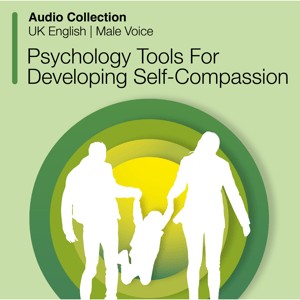Audio Collection: Psychology Tools For Mindfulness
This audio collection is designed to introduce mindfulness skills. It provides guided exercises to help individuals cultivate present-moment awareness and improve emotional regulation through experiential learning.

Download or send

Overview
Mindfulness is a skill to help people foster a connection with the present moment. The Psychology Tools For Mindfulness Audio Collection offers structured, guided exercises based on evidence-based mindfulness techniques that help users cultivate present moment awareness and acceptance.
Mindfulness practice can help individuals disengage from unhelpful thought patterns related to past regrets and future anxieties. This audio collection provides a step-by-step approach to developing mindfulness skills, making it accessible for both independent practice and integration into therapy sessions.
Why Use This Resource?
This collection provides structured guidance on mindfulness practices, making it a helpful tool for individuals and clinicians alike.
- Supports the development of mindfulness skills through structured practice.
- Allows for both standalone use and integration into therapeutic sessions.
- Makes it accessible to beginners and those interested in learning mindfulness.
Key Benefits
Structure
Experiential
Practicality
Effectiveness
Who is this for?
Transdiagnostic
Suitable for most people irrespective of diagnosis.
Generalized Anxiety Disorder (GAD)
Can help reduce excessive worry and anxious rumination.
Depression
Supports the development of a different relationship with one's thoughts.
Chronic Pain
Enhances acceptance and self-regulation of pain experiences.
Stress And Burnout
Provides tools for managing workplace stress and emotional exhaustion.
Emotion Regulation
Enhances the ability to observe and manage emotions without reactivity.
Integrating it into your practice
Educate
Introduce mindfulness principles and their psychological benefits.
Practice
Encourage clients to engage with guided exercises between sessions.
Reflect
Discuss insights and experiences gained through mindfulness practice.
Adapt
Modify exercises based on individual progress.
Maintain
Encourage continued mindfulness practice for long-term benefits.
Theoretical Background & Therapist Guidance
Mindfulness practice is a core component of several evidence-based therapies, including mindfulness-based cognitive therapy (MBCT), mindfulness-based stress reduction (MBSR), dialectical behavior therapy (DBT), and acceptance and commitment therapy (ACT). Across these models, mindfulness is used to enhance present-moment awareness, reduce experiential avoidance, and foster a more accepting relationship with thoughts and emotions. In clinical practice, mindfulness supports emotional regulation, attentional control, and increased psychological flexibility.
This audio collection draws on these established frameworks to offer structured mindfulness exercises that can be integrated into therapy or used independently. The practices help clients shift from reactive, automatic patterns to more reflective and grounded responses. Whether used to manage anxiety, depression, stress, or emotional dysregulation, these exercises promote stability, insight, and a greater sense of control over internal experiences.

What's inside
- Track 1 – Introduction to mindfulness and its benefits.
- Track 2 – Raisin exercise.
- Track 3 – Thinking versus sensing.
- Track 4 – Body scan.
- Track 5 – Mindfulness of breath (short).
- Track 6 – Mindfulness of breath (long).
- Track 7 – Mindfulness of sounds and thoughts.
- Track 8 – Being with difficulty.
- Track 9 – Mindfulness in everyday life.
FAQs
How This Resource Improves Clinical Outcomes
By incorporating mindfulness practice, therapists and clients can:
- Learn to respond to emotions and thoughts with greater flexibility.
- Enhance attentional control and reduces distractibility.
- Promote relaxation and stress resilience.
- Encourage a non-judgmental approach to difficult emotions.
Clinicians Who Use This Resource Also Use
References And Further Reading
- Baer, R. A. (2003). Mindfulness training as a clinical intervention: A conceptual and empirical review. Clinical Psychology: Science and Practice, 10 (2), 125–143. https://doi.org/10.1093/clipsy.bpg015
- Baer, R., Crane, C., Miller, E., & Kuyken, W. (2019). Doing no harm in mindfulness-based programs: Conceptual issues and empirical findings. Clinical Psychology Review, 71, 101–114. https://doi.org/10.1016/j.cpr.2019.01.001
- Brown, K. W., & Ryan, R. M. (2003). The benefits of being present: Mindfulness and its role in psychological well-being. Journal of Personality and Social Psychology, 84(4), 822–848. https://doi.org/10.1037/0022-3514.84.4.822
- Gilbert, P. (2014). The origins and nature of compassion focused therapy. British Journal of Clinical Psychology, 53(1), 6–41. https://doi.org/10.1111/bjc.12043
- Gotink, R. A., Chu, P., Busschbach, J. J., Benson, H., Fricchione, G. L., & Hunink, M. M. (2015). Standardised mindfulness-based interventions in healthcare: An overview of systematic reviews and meta-analyses of RCTs. PLOS ONE, 10(4), e0124344. https://doi.org/10.1371/journal.pone.0124344
- Kabat-Zinn, J., & Hanh, T. N. (2009). Full catastrophe living: Using the wisdom of your body and mind to face stress, pain, and illness. Delta.
- Khoury, B., Lecomte, T., Fortin, G., Massé, M., Thériault, P., Bouchard, V., & Hofmann, S. G. (2013). Mindfulness-based therapy: A comprehensive meta-analysis. Clinical Psychology Review, 33(6), 763–771. https://doi.org/10.1016/j.cpr.2013.05.005
- Linehan, M. (1993). Cognitive-behavioral treatment of borderline personality disorder. Guilford Press.
- Segal, Z. V., Williams, J. M. G., & Teasdale, J. D. (2018). Mindfulness-based cognitive therapy for depression. Guilford Press.
Why Psychology Tools?
Get Support
Sign Up
- © 2025 Psychology Tools. All rights reserved
- Terms & Conditions
- Privacy Policy
- Cookies Policy
- Disclaimer
We value your privacy
This site uses strictly necessary cookies to function. We do not use cookies for analytics, marketing, or tracking purposes. By clicking “OK”, you agree to the use of these essential cookies. Read our Cookie Policy


